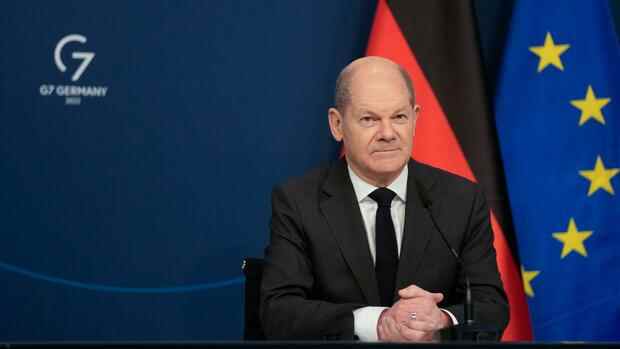The Chancellor hopes for a solution to the Ukraine conflict.
(Photo: AP)
Berlin Chancellor Olaf Scholz has warned Russia to ensure de-escalation on the border with Ukraine. “The Russian side knows about our determination,” Scholz said in a speech at the World Economic Forum’s virtual Davos meeting on Wednesday. “I hope she also realizes that the benefits of cooperation far outweigh the cost of further confrontation.”
The SPD politician said it was not yet possible to say whether the intensive diplomatic contacts could de-escalate the situation that Russia had created by concentrating 100,000 soldiers on the border with Ukraine. “But after years of growing tensions, silence is not a sensible option,” said Scholz.
There is a clear commitment to Ukraine’s territorial integrity. Boundaries should not be pushed by force. The strength of the law must apply and not the law of the strongest.
Scholz for “truly global” vaccination campaign
In addition, Scholz campaigned for greater efforts for a global vaccination campaign against Corona. “Without a truly global immunization campaign, we will soon run out of letters in the Greek alphabet to name new virus variants,” warned the SPD politician. Germany, already the second largest donor to the Covax campaign, will continue to make its contribution, he promised. “Through our support for Covax, we aim to reach 70 percent of the world’s population by mid-year.”
Top jobs of the day
Find the best jobs now and
be notified by email.
One focus of the German G7 presidency will be improving the international health infrastructure, Scholz announced. However, partners, especially from the private sector, would have to help. Fully funding the global vaccination campaign is also “the boost our economies need.”
Scholz also wants to promote efforts for more international climate protection during the German G7 presidency. The SPD politician said on Wednesday at the World Economic Forum’s virtual Davos Dialogue that Europe would not avert the climate crisis on its own. “We will therefore use our G7 presidency to make the G7 the core of an international climate club. We want nothing less than a paradigm shift in international climate policy: by no longer waiting for the slowest and most unambitious, but by setting a good example.” The “cost factor” of climate commitment should be turned into a competitive advantage by agreeing on common minimum standards.
“Ambitious, courageous and cooperative – these criteria will define the climate club,” said Scholz. Members should commit to meeting the 1.5 degree target and becoming carbon neutral by 2050 at the latest. The goal is to limit global warming to 1.5 degrees compared to pre-industrial times.
Scholz went on to say: “Brave, because we are acting now to achieve these goals, for example by pricing CO2 and preventing carbon leakage.” This means that emissions and thus industrial production should be prevented from going abroad be relocated.
At the beginning of the year, Germany took over the G7 presidency from leading Western economic powers. In addition to Germany, the G7 also includes the USA, France, Italy, Japan, Canada and Great Britain. Scholz had already proposed an international “climate club”. Countries willing to protect the climate should move forward together and be able to avoid locational disadvantages.
The annual conference of the World Economic Forum in Davos, which was actually planned for this week, had been postponed due to the Corona situation. Instead, the foundation brings politicians together digitally.
More: Xi promises reforms and openness – but China isolating itself
